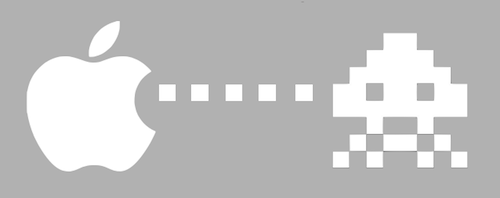Apple: The Game Developer
Posted by Benny Torres | November 1, 2010
iOS has turned out to be a success. Over 120 million iOS devices sold, plenty of happy customers (many a Denuologist counted among them), and plenty of cool stuff on the horizon. But I’m left wanting. There’s just SOMETHING off. There has been since the app store launched, actually. The games are great. There are tons of them. And they’re generally cheap and well made. But I have yet to experience “that iOS game.”
Every game knows “that game.” The game that defines a platform. The game that serves as a centerpiece for a gaming system. The game that just would NOT be possible without that piece of hardware. Wii has Mario. Xbox has Halo. PS3 has Uncharted. iOS has… Angry Birds?
Before we dig into the meat of this argument, lets get some gaming jargon out of the way. You’ll often hear folks talk about first, second, and third party developers in the console gaming space. Third party developers are developers who don’t make their own hardware and don’t hold any monetary or contractual allegiances to a specific piece of hardware. Most developers are third party – including EA, Activision, and Ubisoft. The iOS development world is made exclusively of what, in the traditional console space, would be called third party developers.
Second party developers still have independent identities – but also have contractual or monetary agreements associated with specific hardware manufacturers. They produce games exclusively for a particular hardware manufacturer. In exchange manufacturers will provide internal guidance and access to these developers. A great example is Retro Studios – who made the Metroid Prime series and is now creating Donkey Kong Country: Returns on behalf of Nintendo.
First party and second party developers are almost the same – except for one key difference: these are the folks who are integrated into the actual hardware company. This means the have the support of the entire organization internally to tap into during the game development process. With first (and second) party development, hardware and software can work together seamlessly. They have the closest relationship with the hardware and often times they’re involved in the hardware design process. This means the games that come out of these teams take full advantage of the hardware’s unique features before other teams. The highest rated, highest profile, and highest selling games come from these internal first-parties. Case in point: 8 of the top 10 titles in 2009 and 6 of the top 10 titles in 2008 were developed by first party developers. The marriage of intimate software and hardware knowledge is what gives first party development their advantage.
Steve Jobs recently reiterated that success for Apple comes from an “integrated” approach, it’s marriage between hardware and software. It’s what makes Apple’s built-in apps so damn good (and why they were able to not have an “app store” for so long). Apple’s internal teams make the best apps. And developers look towards these apps for inspiration in terms of simplicity, usability, function and design. iOS game developers have no such leader or inspiration. Let me be clear – there are great games for the iOS platform. But there is no consistent leadership in the iOS game development space.
Normally the hardware manufacturer, through first and second parties, is the one who demonstrates leadership by continuing to push the limits of what the hardware can do. If iOS is to become a legitimate platform for portable gaming in the same vein the PSP or the DS – this consistent leadership in game development is going to be necessary. This type of consistent development leadership simply isn’t possible from third party developers.
Apple has long-ignored gaming on its platforms. Mac gaming has, in the past, been an oxymoron.The success of the app store, specifically when it comes to games has changed that. Apple has started to talk like a gaming company. In multiple keynotes Apple has talked up their big numbers in comparison to traditional gaming hardware. They’ve recently launched an official GameCenter app to centralize achievements, multiplayer, and leaderboards across iOS games. But it’s time to stop the talk and start to walk.
With its Scrooge McDuck levels of cash on hand, Apple certainly has a lot of options when it comes to upping its game. Many independent third party developers are doing amazing things with the platform – and big companies have not shied away from simply acquiring good app developers (see Twitter and Tweetie). Apple can either start from scratch, or absorb someone who has already demonstrated iOS mastery. Microsoft has gone the former route with high profilei acquisitions under its “Microsoft Games Studios” label. Regardless of the path they choose, the direction is clear. To get serious in gaming Apple needs to start leading in gaming. Let’s just hope they don’t call it “Pippin” when it launches.
Leave a Comment
RSS feed for comments on this post · TrackBack URI


